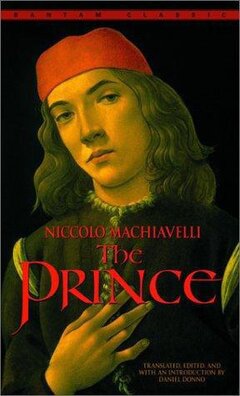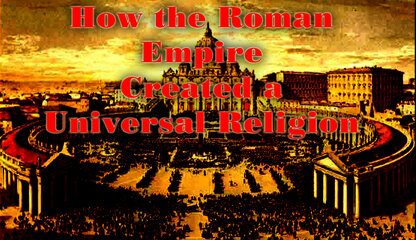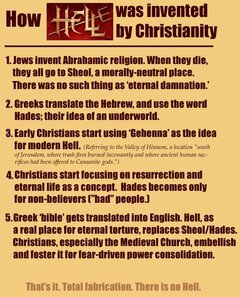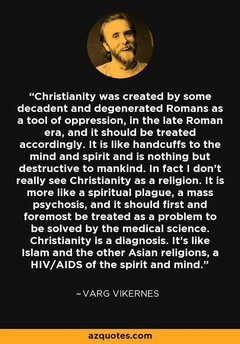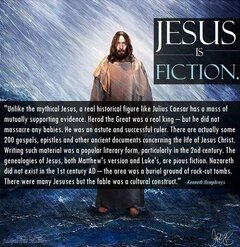- Messages
- 2,145
- Reaction score
- 5
- Points
- 28
SUMMARY:
- This thread will examine works showing that Christianity was a Roman Empire Project
- The common idea among these diverse works implicates one of the oldest established aristocracies of Rome or Europe, the Pisos, which trace their origins back to the days of Alexander the Great
- The undertaking was aimed at pacification and control of empire subjects
- Who the true writers of the New Testament were
- Christianity Project to replace all the other religions that were found all over the old empire. It must be noted that religious diversity had been a source of major headache for the Roman Empire at this time.
The Synthesis of Christianity
Introduction by Dr. Dorothy B. Thompson PhD
It has been my recent privilege to receive a manuscript by Roman Piso, entitled The Synthesis of Christianity (NOTE: see attached). I have read dozens of books about the history of Christianity, but this one is by far the most unique.
Perhaps Piso’s quote from Abelard Reuchlin sums up his thesis best:
“It was Flavius Josephus who was the creator of Jesus.”
Piso spent many years researching the fraud of Christianity. It seems that many scholars had previously come to the conclusion that Josephus had indeed created Christianity.
This book, however, presents the authorship of the New Testament as regards the Roman Piso family, the antiquity of which goes back to ancient Rome. Members of the royal Piso family were the composers of the New Testament. The reasons are discussed in the “Piso Theory” and the “Royal Supremacy Theory.”
In a nutshell, the Royals of ancient times invented and promoted superstitions for the purpose of controlling people. The Royals were the only ones who were literate, and who had freedoms, including the freedom of speech. Promoting religion for the purpose of control was the duty and responsibility of the Royals, who were atheists. They knew there were no gods, for they had created them. The main control they sought to preserve was slavery.
Intricate family archives kept track of ever evolving dogmas. Later writers had access to earlier records for their creations. Through the centuries the Royals carefully guarded their great hoax and seemed to thoroughly enjoy the creation of the masterpiece. As Piso describes it,
“being an ancient author was like being in on a long, longstanding perpetually running inside joke.”
Piso discusses the “penis worship” which is the truth of the New Testament, the “number system” used by the Royals, fascinating members of the Piso family lineage, intricate historical accounts, and the political reasons behind the Christian Myth. The Royals, of course, took pseudonyms for the authorship of their creations. Thus the alias Flavius Josephus. Piso’s evidence is clearly and superbly presented and meticulously documented.
I wonder if the Royals had any idea of the viscous quality of what they created—their sick joke. Realizing who was responsible for the creation of such a monstrous lie certainly won’t endear the Royal Pisos to you, but you’ll love this interesting and important book
Specific Items in History Related to the "Synthesis Of Christianity"
A CHECKLIST OF WHAT WE HAVE FOUND TO BE THE CASE
(1) Emperors were NOT made of common persons. They were in fact all of royal families regardless of what "history" tries or attempts to make the reader believe. This is because of the 'controlled' environment that existed at the time, which is also listed and explained.
(2) As such, there were no "dynasties" as we have been led to think of them. All Roman rulers were inter-related. There were 'branches' of the same family that switched off or took turns ruling so that it appeared that anyone could become emperor, etc. In other words, a deliberate 'facade' was created and maintained for specific purposes.
(3) All religious leaders were closely related to royalty and of royal houses, such as Popes, 'saints' and church writers, as well as 'historians'. No one was allowed to write for the public except royals and their close relatives. This was because it was a dangerous thing for royalty to allow freedom of speech to the common people. If the common person was allowed to speak freely to the masses and they somehow found out or deduced the situation, that would threaten the whole system that was in place and that had been in place for thousands of years.
(4) They all (rulers, writers, etc.) made use of alias names in order to hide their true identities and to be able to give all of the information about themselves and their families, ancestors, etc. that they wanted to and still not let the cat out of the bag. They made it so that we would have to deduce the truth from what they left. They made us (they thought) dependent upon THEM and what they wrote in order to find out and 'confirm' the truth to the degree that THEY allowed us to. This, is what they refer to as the 'Grace' of god. (sic) However, they could not know that we would later have other means in which to make determinations regarding this—and we will discuss that later.
(5) They made use of a wide variety of methods and means in which to control and manipulate the masses. Persons usually refer to this subject as the 'Pisonian Conspiracy', which is NOT a title that we gave this—but rather what the ancient 'historian' Tacitus called it. The Pisos happened to be behind the composition of the New Testament, but the Pisos were not alone in this. In reality, this was simply an effort on the part of all royals who wanted to preserve and continue the practice of slavery. At the time, there were several royal houses at odds with each other over this issue and a long all-out war resulted. The New Testament was simply a 'solution' for the royals who wanted to retain the practice of slavery as well as to increase their power and control over the masses via ideologies given out in the New Testament in rhetorical form. They made full use of all that they had put into the New Testament.
(6) They kept their own private records or archives as to the truth behind all of the works that each particular family branch had written for public consumption. They refer to them in a number of ways, and it becomes evident that later writers made use of records from within their own family archives to create their later works from.
(7) They (the persons who wrote the New Testament, etc.) were able to do these things because of the pre-existing mechanism or system of control over the masses which we call "the closed environment", but which is also known as a "controlled" environment. Which simply stated means that ONLY royals could write works for public consumption—and even then only with permission and approval of a royal counsel. There were NO common persons with the ability to communicate with the masses at large. No freedom of speech. Everything that was written of for the masses were carefully conceived, created, approved of by royalty and had motives behind them for being written.
(8) The main reasons for the New Testament being written was:
a) as a means by which to preserve and continue the practice of slavery and
b) to disseminate rhetorical ideologies to the masses that would make them more easy to control and manipulate. And,
c) to be a 'universal' or 'catholic' religion so as to extend their power and control over the masses to other conquered countries and to more easily conquer other countries.
b) to disseminate rhetorical ideologies to the masses that would make them more easy to control and manipulate. And,
c) to be a 'universal' or 'catholic' religion so as to extend their power and control over the masses to other conquered countries and to more easily conquer other countries.
They aimed at conquering India for example, which they never really did despite their efforts to do so. They were ALWAYS aiming at extending Roman boundaries.
(9) There was a long all-out war going on between royal houses over the issue of slavery before and as the New Testament was being written. At several points the Romans could very well have LOST the war* and they (the Romans and their allies) were in desperate need for more and better means with which to
a) put down revolt of the slaves themselves and make them complacent and as 'content' as possible in their situation—even going as far as to offer them (in the NT) life after death and a 'reward' in heaven.
b) They needed to make their own military stronger, loyal, and braver, as well as filled with HATE for the enemy; "the Jews."
c) They needed to offer the same 'life after death' to their own soldiers so that they would not be afraid to die in battle. And,
d) they needed a means by which to console the widows and other relatives of soldiers who would fall or die in battle (as well as 'hope' for the crippled, etc.). All of this was done via the rhetoric and ideology that they placed into the New Testament. And,
e) they could NEVER let the masses know that they, the ROMAN royalty manufactured this great lie—so they HAD to appear to be either indifferent and/or non-approving of it (the Christian religion and Christians).
b) They needed to make their own military stronger, loyal, and braver, as well as filled with HATE for the enemy; "the Jews."
c) They needed to offer the same 'life after death' to their own soldiers so that they would not be afraid to die in battle. And,
d) they needed a means by which to console the widows and other relatives of soldiers who would fall or die in battle (as well as 'hope' for the crippled, etc.). All of this was done via the rhetoric and ideology that they placed into the New Testament. And,
e) they could NEVER let the masses know that they, the ROMAN royalty manufactured this great lie—so they HAD to appear to be either indifferent and/or non-approving of it (the Christian religion and Christians).
The only way that you would ever know that it was them was in knowing all of the facts that they had hidden - because those facts reveal their motives, and that is when the truth is finally discovered.
An example that stands out is Pliny the Younger's epistles to the emperor Trajan regarding his 'questions' as to what to do about or with those claiming to be 'Christians'. This is magnificent rhetoric. He ends up,
a) advertising the religion,
b) making Christians appear to be 'martyrs', and
c) effectively hiding the fact that they (the Romans) actually 'created' the religion!
b) making Christians appear to be 'martyrs', and
c) effectively hiding the fact that they (the Romans) actually 'created' the religion!
(10) The 'historians'
These are the persons who wrote the works that we depend upon to tell us what happened. Yet, we have discovered that they,
a) were NOT who they led us to believe they were, and
b) they deliberately mislead us and lied to us in order to hide the truth.
b) they deliberately mislead us and lied to us in order to hide the truth.
Only the royals and their close relatives were allowed to write public works, and THEY are the ONLY ones that are referred to in 'history' when they spoke of peoples or sects. The common person was not worthy of mention in history except in general groups such as 'legions' or such and then nearly always, if not always, in order to 'glorify' or otherwise refer to the leaders of those legions, etc.
(11) One of the most important things to know in order for a person to work their way through the maze or 'puzzle' of ancient history in New Testament times is to know just who the 'Jews' were at any given time and place. This means knowing all about each of the sects in the most specific detail and to do this one must do a lot of reading and deducing. However, once this IS known, one is then able to discover so much more than before. The 'historians' played the 'shell game' when it came to the 'Jews'. They often refer to them in general terms and hardly ever make distinctions about just WHICH sect of the Jews they are speaking of at any given time. This means that one must use all available facts in order to deduce that and make the distinctions for themselves. We explain in our findings just who the 'Jews' were at any given time and place. And this will definitely help future researchers.
(12) *Yes, as mentioned, the Romans came close several times to losing the war. There were several very important factors that could have well meant that the outcome may have been different. One of those things was that Nero had executed Gaius Piso and others who were allied to their cause. Before Nero, Claudius had also executed a number of the Pisos and their allies. But Arrius Piso and others of the Piso family were left along with many of their allies. Then, as a Roman general Arrius Piso was very nearly captured and/or killed many times when he came to the Temple and various meetings with the Pharisees for the purpose of trying to persuade them to go along with him and his allies to change over to his new religion. He could have been easily killed then and that would have probably been the end of that part of the war and much of the later escalation of the war may not have ever happened.
In addition to this, Arrius Piso was nearly killed when his horse fell on him. It did not kill him, but it did crush his leg and made him 'lame' in that one leg. The extent of his injury and recovery is not known for certain at this time. Then, at the Pass of Beth Horon, he was ambushed by his Jewish enemies (the Pharisees) and was nearly caught and killed there. He was truly the cat with nine lives! In every battle that he was in, HE was the 'prize' that was sought by his enemies. It was known to his enemies that it was vital to stop him from ever doing what he had planned to do—and that was to enslave all of humanity other than royals into a perpetual ignorance and to 'dumb' down the common persons with rhetoric so as to enslave them with rhetorical ideologies.
(13) Genetic Testing
This is what we think will be the final indisputable proof regarding this. As we stated, the authors of 'history' claimed to be persons other than who they really were and the same was true of those who were emperors (as well as both earlier and later royalty). We also said that 'saints' were close relatives of these same persons. These things can be verified now with genetic testing. In fact, we are certain that in time, enough of this sort of evidence will be compiled to show just how accurate our reconstructed genealogy of these persons really are—and we are very anxious to see this! Because we have followed various 'rules' in order to reconstruct their family tress, 'rules' that were made and left by those very persons!
For instance, they left hints and clues to follow in order to find the facts that would help a person to make those reconstructions. One instance comes to mind and that is of the emperor Constantine's claims of descent from 'Claudius'. He means, of course, the emperor Claudius II 'Gothicus'. We have examined this in very fine detail and have concluded that this was only possible in ONE way. And because that is the case, that IS his actual and true descent from Claudius II 'Gothicus'.
However, to find that line of descent a vast knowledge of many things that may otherwise seem unrelated must be known. And, you have to know the line of descent of Claudius II Gothicus as well. This is not at all 'easy' and it IS very easy to make mistakes when reconstructing these lines of descent. It was made difficult on purpose.
Bear in mind that these persons did not have to work for a living, they did not have television and had little else to do but to make these 'amusements' for themselves and their other royal relatives. Being an ancient author was like being 'in' on a long, long standing perpetually running 'inside joke'. And it was treated seriously and as a 'duty', but one that the authors could not help but have 'fun' with as they created their works.
And if, after reading this, any reader suddenly felt the urgent need to puke, I would understand that too....
Attachments
Last edited:


